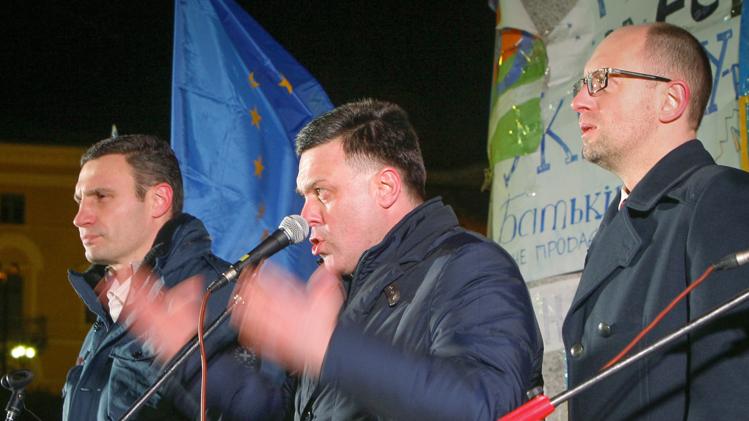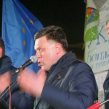
Anti-Government Protests Unite Ukrainian Opposition
Publication: Eurasia Daily Monitor Volume: 10 Issue: 222
By:

Ukrainian opposition leaders have been showing unprecedented unity since the start of the anti-government protests almost two weeks ago. Initially, it seemed as if the protests against the government’s refusal to sign an association deal with the European Union had been hijacked by the opposition parties from the bloggers and students who started the demonstrations last month. But the opposition soon appeared at to be at a loss about what to do next as few cracks were showing in the ruling elite. Their cause seemed especially helpless when the government of Prime Minister Mykola Azarov survived a no-confidence motion in parliament on December 3 (see EDM, December 4). However, events of the last several days showed that the Ukrainian opposition is currently probably as united as never before, and has become quite difficult for the government to deal with.
The government apparently hoped to drive a wedge between those who organized the pro-EU demonstrations in Kyiv on November 21–24 and those who, after a brutal dispersal of peaceful protesters from Independence Square (“Maidan Nezalezhnosti”) by riot police on November 29–30, changed the focus of the massive protests across the country to demands to dismiss the government and call for early elections. First Deputy Prime Minister Serhy Arbuzov, who is apparently being groomed by President Viktor Yanukovych for prime minister, said in an interview with 1+1 TV on December 5 that the government was ready for talks with the opposition, but the opposition, he said, was not. Arbuzov asserted that the government was eager to talk with “the students” who started the protests, while adding that the opposition parties and “the students” had different goals.
However, so far there have been no visible signs of a rift on the Maidan between the non-partisan protesters, most of whom join the protesting crowds mainly toward the evening and on weekends, and the opposition party activists who build barricades during the day and guard them at night, living in the administrative buildings occupied by them in downtown Kyiv. Moreover, the leaders of the three main opposition parties participating in the protests, heavyweight boxing champion Vitaly Klichko of the liberal UDAR (Ukrainian Democratic Alliance for Reform—the abbreviation of which spells the Ukrainian word for “Punch”), Arseniy Yatseniuk of the moderate nationalist Fatherland, and Oleh Tyahnybok of the far-right Freedom party, have managed to set aside their differences and presidential ambitions for the sake of a common goal. For them now, the main objective is to topple the government so as to sign an Association Agreement with the EU later on. Those who had started the protests hoped that Yanukovych himself would go through with the deal.
On December 5, the opposition came up with a clear-cut set of demands to the government. These included criminal liability for those who triggered bloodshed on November 29–30, including Interior Minister Vitaliy Zakharchenko; the freeing of the protesters who were arrested on November 30–December 1; dismissal of the government, to be followed by parliamentary and presidential elections; and the signing of the association and free-trade agreements that Yanukovych refused to sign with the EU in Vilnius on November 29 (Channel 5, December 5).
From the start, the most radical protesters had demanded President Yanukovych’s impeachment. This demand is apparently shared by Yanukovych’s greatest political rival, the imprisoned former prime minister Yulia Tymoshenko, according to a speech her daughter gave before an estimated crowd of hundreds of thousands of anti-government demonstrators in Kyiv on December 8 (Kommersant-Ukraine, December 9). However, the opposition triumvirate has managed to set aside their heated emotions and drop this demand as unrealistic. Impeachment would require a long procedure involving the Constitutional Court, which is full of Yanukovych’s appointees, and 338 votes in favor in the 450-seat single-chamber parliament, which is dominated by the president’s Party of Regions.
The opposition spoke with one voice at the massive December 8 rally. They have behaved impeccably, meticulously avoiding physical confrontation even in the early hours of December 10 when riot police unblocked the government quarter, which the protesters occupied a day before, by demolishing their barricades (Ukrainska Pravda, Channel 5, Segodnya, December 10). Both sides have to take credit for avoiding violence after December 1. One could have expected that the peacefulness and quiet determination of the opposition triumvirate would discourage and frustrate the more radical protesters—such as the far-right militants close to Freedom—and start a rift within opposition ranks, but this has not happened thus far.
However, a deep division remains on a national scale, between the western part of Ukraine, which largely distrusts Yanukovych and has always been pro-European, and the more pro-Russian east, which tends to be skeptical of the EU and where the opposition parties are unpopular. The majority of the population in the eastern and southern, mainly Russophone, areas have been either indifferent or hostile to the protesters. While hundreds of thousands took to the streets of Kyiv on December 1 and December 8 to protest against the government, anti-government rallies in such large eastern cities as Donetsk and Kharkiv gathered only hundreds. A nationwide poll conducted by R&B group on December 4–9 found that 49 percent of Ukrainians support the current anti-government protests while 45 percent do not. The protests are overwhelmingly supported in western Ukraine, where 84 percent of locals supports them, and flatly rejected in the east (81 percent) (https://rb.com.ua/rus/projects/omnibus/8836/). For now, there is little evidence that this split can be easily overcome by the Ukrainian opposition.




